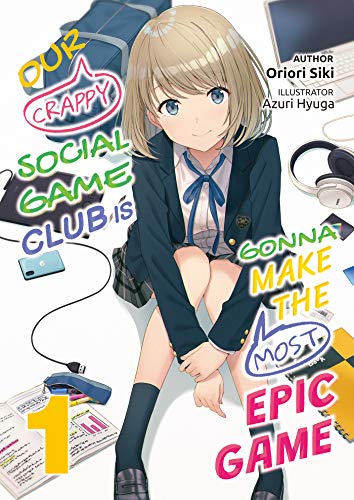By Oriori Siki and Azuri Hyuga. Released in Japan as “Jakushou Soshage-bu no Bokura ga Kamige wo Tsukuru Made” by Overlap Bunko. Released in North America by J-Novel Club. Translated by Mikey N.
Sometimes you just have to power through even when your initial impression is bad. This novel started off iffy for me. A sad-sack protagonist who had difficulties communicating with others. A perky, happy ball of sunshine who ends up dragging him back into a world he was desperately trying to avoid. Even the world the book takes place in didn’t impress me; it’s not a fantasy or isekai, but it does take place in a world where education has become driven by “gacha”, that game mechanic where you spend money to get a cool thing – possibly. I’m not sure why it needed to jump through the extra hoops, unless a pre-reader asked why everyone cared so much about social games. Fortunately, after a rough start it settles into what the book is actually about: the trauma of past failures crippling your ability to move forward and recognize your own worth, and how others can help you move past that.
Kai has just moved far from Tokyo after being driven from his previous school, one of the best in the country, for sabotaging a popular social game for reasons we are not immediately privy to. He’s trying to move on and have nothing to do with social games, but unfortunately, he’s arrived at one of those “everyone has to be in a club” schools, and the girl showing him around, Aoi, is head of the Social Game club, which consists of her, programmer and gacha-addict Aya, and perpetually angry artist Eru. The club is about to be shut down, and the Student Council President hates it, so Kai joins up impulsively. Unfortunately, the club is a mess – Eru is angry at Aoi, Kai, and most everything else, Aya is never there as she has to gacha all the time, and Aoi’s bubbly, happy side masks a girl who fears she is useless and a burden. Can the club be saved in time?
As I said, when you get past the original cliches (there’s also a pervy older sister who loves to tease Kai, and the arrogant/snarky student council duo are pure 100% cliche), there’s more to like here than expected. Kai, of course, did not sabotage the game back in Tokyo because he was being a villain, it was for a very good reason. Both he and Aoi suffer from crippling self-doubt, and both of them have to have it demonstrated to them, explicitly, that their fears are unfounded. Kai really does have terrific value as a planner, as his sempai at the Tokyo school (who is awesome, and has a great semi-robotic speech pattern) demonstrated to him, and while Aoi’s art is still not as good as Eru’s, she is improving constantly and is ready to take the next step. They make their game better AND they step in to help save the original game that Kai sabotaged. It’s quite the feel good ending.
So yes, there’s gold to be found here, though I’d recommend liking gacha games a whole lot more than I do if you really want to get the full experience.
